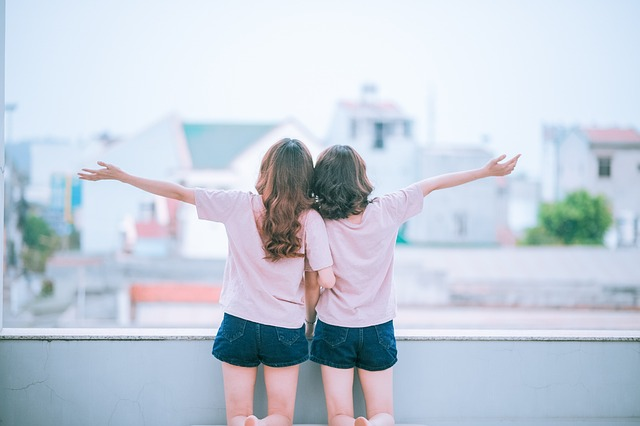Times have changed for the LGBT community. Things are far from ideal, but acceptance of the LGBT is steadily increasing. Besides, technology is slowly allowing members to transcend biological limits imposed by their sex.
For example, same-sex unions, such as lesbian couples or gay male couples, used to become unable to bear their children. Their sole option to have a child used to be through adoption. Advanced in reproductive health care are now creating new ways for these couples to have a child connected to them biologically. These methods are already available to the public and offered in some countries. Further experimental techniques currently being tested will allow same-sex couples to have children that share their genes.
Indeed, there are now several options for a lesbian couple to achieve pregnancy. There are currently two commonly-available options:
-
In vitro fertilization, or IVF, done in laboratories, results to embryos implanted in one of the partners
-
Artificial insemination, where sperm from a male donor is used to impregnate one of the partners

In Vitro Fertility Treatments for a Lesbian Couple
Compared to artificial insemination, IVF procedures are more detached from the usual process of reproduction. As the name implies, in vitro fertilization is a lab procedure, with the fertilization process happening outside of the female body. If you are already in the process of IVF, having this IVF positivity planner might be an additional help for your journey.
Generally, doctors extract eggs from one of the partners. The choice of who will supply the egg depends on several factors, such as fertility, general health, as well as where the person is in the menstrual cycle. Of course, there is also the consideration of personal preferences.
The chosen person is usually monitored closely for signs of ovulation. In many cases, she has to take medication that stimulates egg production. Once ovulation occurs, the eggs are extracted and processed using laboratory techniques. Many eggs used since fertilization rates are usually lower for in vitro fertilization compared to normal reproduction.
Sperm is obtained from a suitable donor and placed inside the extracted eggs.
The resulting zygotes are nourished and left to develop for a few days. They implant the most promising ones on the uterus of the partner who will carry the child. The rest of the eggs are usually for backups, just in case of implantation fails.
A lesbian couple would usually have one partner supply the eggs and have the other partner carry the child. This setup allows both of them to have a biological connection with the child. For those who are part of a lesbian couple who wants to carry a baby but has a history of infertility, Nina Resetkova, MD, MBA says “We many need to initiate treatment with IVF to treat her infertility. Potentially, that’s her only way to get pregnant.”
The advantages of in vitro fertilization are mostly the result of having fertilization done externally. Many diseases and conditions can cause permanent scarring of the Fallopian tubes, which can block the egg from going down into the uterus. Typically, these disorders render affected individuals sterile, but IVF allows them another chance to become pregnant.
Disadvantages of IVF include its high cost, as well as higher complication rates. In some areas, there might be insufficient clinics and health centers that are proficient enough in IVF.

Artificial Insemination as a Fertility Treatment
Another option for a lesbian couple to become pregnant involves artificial insemination. Donor sperm is collected and implanted into the reproductive tract of one of the partners.
Artificial insemination comes in two varieties. The sperm may be placed directly in the vagina using a special syringe. This option is relatively straightforward and can be done at home as long as the tools are available.
Another option is to place the sperm within the uterus itself, which results in increased fertilization rates due to the closer proximity to the ovaries. However, there is also a higher chance of infection, and the procedure must be in a clinical setting.
Dr. Vaishali Sharma MD, says “The best part is that during the artificial insemination, the sperm used during the treatment is tested for any genetic disorder. This way, it reduces the chance of any disorder being transmitted to the child from a parent.” Artificial insemination is cheaper and comes with fewer complications. However, it may not be an option for people who have damaged reproductive tracts. Artificial insemination is also less participative, as it only allows one partner to participant in the process.
Medical and Psychological Screenings
Deciding to start a family is a beautiful and significant step in your journey together. For lesbian couples, this path is filled with unique considerations, hopes, and dreams. It’s a time of excitement, but also one where the importance of health – both physical and emotional – comes into sharper focus. Understanding and navigating the medical and psychological screenings involved in considering pregnancy options is a crucial part of this journey. Let’s explore this together, with empathy, care, and the shared joy of creating a family.
The Importance of Medical Screenings
Medical screenings are a vital first step in your journey towards parenthood. These screenings help ensure that you are in the best possible health to conceive, carry, and raise a healthy child. They are not just a formality; they are a way to understand your body better and to address any potential health issues that could affect your pregnancy or your child’s health.
-
Fertility Assessments: Understanding your reproductive health is crucial. Fertility assessments can provide valuable insights into your reproductive potential and help guide decisions about which pregnancy options might be most successful for you.
-
Genetic Counseling: This is an opportunity to learn about your genetic makeup and any potential risks that could be passed on to your child. It’s a conversation filled with hope, but also grounded in the reality of wanting the very best start for your future child.
-
Health Check-ups and Immunizations: Ensuring you’re up to date on immunizations and are in good general health is not just about you – it’s about providing a safe, healthy environment for your child to grow, both in utero and at home.
Navigating Psychological Screenings with Compassion
The journey to parenthood is not just a physical process; it’s deeply emotional and psychological. Psychological screenings are an essential step in preparing for the emotional aspects of pregnancy and parenting. These screenings are not meant to judge, but rather to prepare and support you.
-
Emotional Readiness: Bringing a child into your family is a life-changing decision. Psychological screenings can help you explore your feelings, expectations, and readiness for this next big step in your lives.
-
Support Systems: These discussions can also help identify the strength of your support systems. It’s about ensuring that you have the emotional and practical support needed to navigate the ups and downs of starting a family.
-
Coping Mechanisms: Understanding how you cope with stress and change is crucial. Parenthood is a beautiful journey, but it comes with its challenges. Being prepared mentally and emotionally can make all the difference.
Walking This Path Together
Starting a family is a journey of love, and every step you take towards this goal should be enveloped in care and understanding. Medical and psychological screenings are not just tasks to be checked off a list; they are part of the foundation you are building for your future family. They are steps taken in love, with the well-being of your future child at heart.
Remember, you’re not alone in this journey. There are professionals who can guide you, communities who can support you, and countless resources to help you navigate this path. Your love for each other and for your future child is a powerful force. Let it guide you through these steps with confidence and hope.
Embracing Your Path to Parenthood
As you move forward, remember that every step you take is a part of your unique story. Your journey towards parenthood, with its careful considerations and preparations, is a beautiful testament to your love and commitment to each other and to your future family. Embrace each step with kindness, patience, and support for one another.
In this journey, love is the beginning, the journey itself, and the destination. Together, with care and thoughtful preparation, you can navigate the complexities of starting a family, turning challenges into stepping stones towards fulfilling your dream of parenthood.
Choice Of Sperm Donor For Lesbian Women
For both IVF and artificial insemination, the choice of a sperm donor is essential. A lesbian couple usually has two options.
One option is to obtain sperm from a sperm bank, which is a facility that collects and processes sperm. Sperm banks screen donors thoroughly for any sexually transmitted diseases, so the risk of acquiring one is minimal if a couple goes by this option. However, couples cannot choose the actual donor, as all donors are anonymized. “Typically, we recommend using an anonymous donor because when using a known donor, there are many other challenges legally that can also stall the process,” Candice Perfetto, MD, fertility specialist adds.
Another option is to obtain sperm from a donor contacted by the couple. The couple gets to choose the donor, which is one significant advantage of this technique. However, rigorous screening must be done to ensure that no diseases are passed on to the partner or the baby. Legal work is also mandatory, as donors may later argue for custody rights of the child.

Experimental Techniques
Currently, there are no commercially available procedures that allow a lesbian couple to have a child that shares their genes. The closest is to utilize a sperm donor that is genetically related to one of the couples.
However, there are experimental techniques that seek to change this scenario. One method relies on the use of stem cells, which are cells that can turn into any other cell of the body. Theoretically, it should be possible to obtain stem cells from each partner, then turn them into sperm and egg cells. Fertilization can be through IVF.
So far, animal trials show promising results. The procedure was used successfully in mice to produce healthy sperm and egg cells from stem cells. However, experiments with humans are still far from complete. While human stem cells can convert to progenitor cells that give rise to sperm and egg cells, the resulting cells are still immature.
More research needs to be done for this procedure to become commercially available. Even then, the method prioritized treating couples which may be unable to produce sperm and egg cells due to injury or disease. However, the future holds great promise, as this procedure may eventually allow a lesbian couple to have a child that has their genes.
Countries Where A Lesbian Couple Can Get Married
Of course, getting pregnant is just part of the story. Having and raising a child may be more difficult if the state does not acknowledge the union of the partners in the first place. Despite the increasingly progressive views towards LGBT relations, many countries still do not recognize same-sex unions.
Government recognition grants partners several rights, as well as access to health care and other considerations for married couples. Hence, it is essential to consider places where same-sex couples can get married. For now, here is a list of countries where same-sex unions are recognized:
-
The Netherlands
-
Belgium
-
Canada
-
Spain
-
South Africa
-
Norway
-
Sweden
-
Iceland
-
Portugal
-
Argentina
-
Denmark
-
Uruguay
-
New Zealand
-
France
-
Brazil
-
England
-
Scotland
-
Luxembourg
-
Finland
-
Ireland
-
Greenland
-
United States
-
Colombia
-
Germany
-
Malta
-
Australia
Disclaimer: The information on this site is not intended or implied to be a substitute for professional medical advice, diagnosis or treatment. All content, including text, graphics, images and information, contained on or available through this website is for general information purposes only. Please see a medical professional if you need help with depression, illness, or have any concerns whatsoever. WE DO NOT OFFER MEDICAL ADVICE, COURSE OF TREATMENT, DIAGNOSIS OR ANY OTHER OPINION on your conditions or treatment options. SERVICES OR PRODUCTS THAT YOU OBTAIN THROUGH THIS WEBSITE are for information purposes only and not offered as medical or psychological advice, guidance or treatment.
We also use some affiliate links in this blog to help support continuous production of wholesome parenting content such as this. 🙂 Feel free to use them to show your support.
Frequently Asked Questions (FAQs)
-
Do lesbian couples get pregnant at the same time?
-
How do lesbian couples decide who gets pregnant?
-
Can 2 women’s eggs make a baby?
-
How can 2 girls have a baby?
-
Can 2 females have a baby together?
-
How do two lesbian couples conceive?


